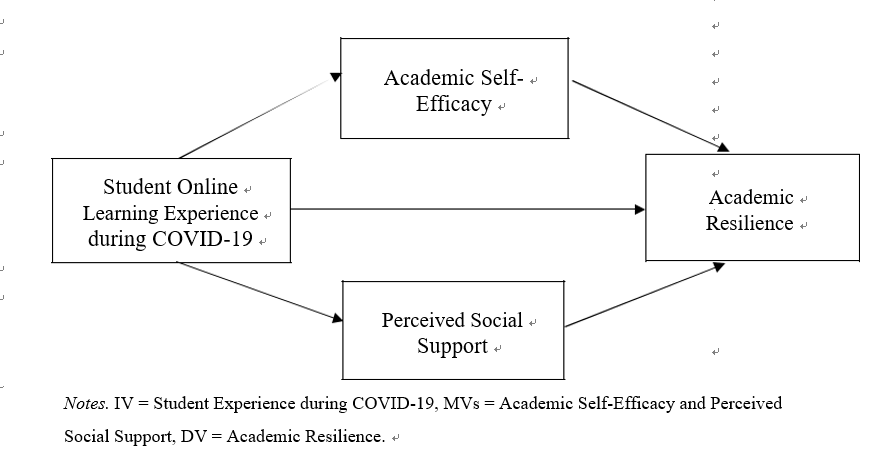Besides the innate qualities described in the “5-C” model (Martin & Marsh, 2006), academic resilience may also be influenced by external factors such as social sup-port within the individuals’ social environment (Permatasari et al., 2021). For exam-ple, positive social support from friends has been shown to act as a buffer for students under stress (Wilks & Spivey, 2010) and can influence the effects of self- efficacy in students (Narayanan & Onn, 2016). It has also been shown to predict academic resilience among first-year Malaysian students (Narayanan & Onn, 2016), social work students (Wilks & Spivey, 2010), and, most recently, during the pan-demic among undergraduates in China (Mai et al., 2021) and the United States (Lady, 2021).
Social support covers a broad system of family, friends, significant others, class-mates, lecturers, and the community. It can be defined as a relationship formed among at least two individuals, with the perception that said individuals feel cher-ished and supported through their difficulties (Brief & Weiss, 2002). Perceived social support is a component of social support based on one’s subjective view of feeling cherished, and worthy, and having a social network that one can rely on for support in times of need (Mai et al., 2021). And in the context of social distancing and lockdown restrictions during the pandemic, students’ need for social support becomes more crucial.
The value of social interaction has been shown by Sarmiento et al. (2021) to be a protective factor against the rise in stress, worry, dread, loneliness, and other nega-tive emotions that university students experienced during forced confinement dur-ing the pandemic. Although the transition to online learning may have produced a useful option to support students who continue their education from a distance, it has been discovered that online learning results in a greater sensation of loneliness and isolation than face-to-face sessions (Saltzman et al., 2020). Face-to-face ses-sions allow students to engage and build social networks because of their close physical contact. By preventing students from forming relationships and fostering interpersonal connections, social distancing rules will likely worsen students’ feel-ings of isolation and lower psychological wellness throughout the epidemic (Liu et al., 2021).
Sun et al. (2020) investigated the relationship between perceived peer support and depression among Hong Kong university students. Their findings revealed a negative relationship between students’ perceived accessible peer support and self- reported depressive symptoms, emphasizing the importance of relational elements, such as perceived available peer support, for students’ mental health during the pandemic. A mixed-method study by Lady (2021) on the importance of social support for American undergraduate students’ academic resilience found that par-ticipants reported fewer social interactions and a smaller social circle during the pandemic, leading to feelings that significantly influences academic resilience among Indonesian students. Thus, while the COVID-19 pandemic has caused restrictions to social interactions and lower quality relationships with other students and teachers, perception of support, encouragement, and care coming from their social circle can boost their academic resilience to better face the challenges of online learning. The Current Study
As previously outlined, academic resilience can be predicted by online learning readiness (Ramadhana et al., 2021). However, the mechanism that drives this link has not been sufficiently researched to explain it. Therefore, we investigated the fol-lowing model (Fig. 3.1) to gain insight into how social support and academic self- efficacy perception could affect the relationship between students’ online learning experience during COVID-19 and their academic resilience.
We hypothesized that positive online learning experience during COVID-19 would predict higher academic resilience, and that this relationship would be medi-ated by academic self-efficacy and perceived social support. We also hypothesized that students with positive experiences would also show higher levels of academic self-efficacy and perceive their social support system to be stronger.

Fig. 3.1 Proposed mediation model for the impact of student online learning experience during COVID-19 on academic resilience via academic self-efficacy and perceived social support. Notes. IV Student Experience during COVID-19, MVs Academic Self-Efficacy and Perceived Social Support, DV Academic Resilience